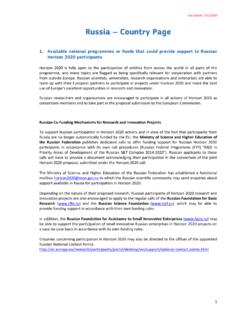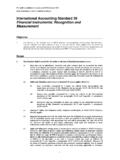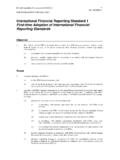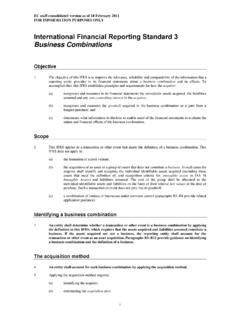Transcription of Document II/4 - The Impact of Globalisation on Employment
1 1 Document II/4 - The Impact of Globalisation on Employment Michel A. DI PIETRO, Esther Mirjam GIRSBERGER, Alain VUILLE Swiss Federal Statistical Office (FSO), Switzerland The paper deals with the Impact of economic Globalisation on Employment from a statistical governance perspective. It looks firstly at the different ways in which economic Globalisation may Impact on Employment , using economic theory and empirical findings. It then reviews and assesses some analytical tools that can be considered to measure this Impact .
2 It goes on to examine briefly the situation in the ESS to evaluate the extent to which it delivers relevant information on the issue. Finally, it raises the question of whether NSIs should engage more forcefully in Impact analysis. 1. Introduction Globalisation generally refers to various dynamic phenomena that have the following elements in common: (i) they cut across national boundaries and (ii) they result in higher integration or interdependence of human societies. Globalisation can be of an economic, social, political or environmental nature, for example.
3 In this paper we shall restrict ourselves to economic Globalisation , that is to increasing flows of production factors (capital, labour), of products (goods, services), and of technology between national economies. We shall first consider how economic Globalisation might Impact on Employment , then review some analytical tools that can be used to assess this Impact , and finally look at the informational situation in the ESS with respect to Globalisation and Employment . It should be noted that Employment may 2also have an Impact on Globalisation (reverse Impact ).
4 This aspect is, however, beyond the scope of the present paper. 2. Ways in which economic Globalisation may Impact on Employment We have identified seven aspects of Employment on which economic Globalisation may have an Impact . This list is not intended to be exhaustive. It will simply show the diversity and complexity of the issue. Number of jobs Economic Globalisation may first have an Impact on the number of jobs available in the economy, and thus affect key macro-economic variables such as the unemployment rate and the Employment -to-population ratio.
5 The issue is made more complex by the fact that the Impact can be different at the micro-economic level (establishment, enterprise, economic activity) and at the macro-economic level (total economy), as well as in the short/long term. Offshoring is a case in point [1]. Closing an enterprise in country A to move it to country B may result in job losses in a particular economic activity of country A. It may also result in job gains for country A as a whole because of higher productivity in the remaining enterprises, higher wages, and higher consumption demand.
6 This optimistic view seems to be supported by some of the latest ILO analyses, according to which the number of jobs available in the world is higher than ever before [2]. Factors other than economic Globalisation , such as demographic growth, may however be the real cause of this situation. Structure of jobs Economic Globalisation may also affect the structure of jobs, their distribution across economic activities. Jobs linked to certain economic activities may tend to disappear whereas jobs linked to other, maybe new activities, are created due to changing competitive advantages and patterns of specialisation [3].
7 Here again the issue is made more complex by the fact that changes in the structure of jobs can be caused by economic Globalisation but also by technological progress, for example. Composition of jobs 3 The composition of jobs, the mix of skilled and unskilled jobs in the economy, is also likely to be affected by economic Globalisation . So far, in developed countries, low-skilled workers have been most affected by stagnating revenues and / or increasing unemployment due to competition from developing countries workers and also as a result of technological progress.
8 The workforce in developing countries, however, is becoming better qualified and increasingly engaging in more sophisticated, service-oriented activities. Skilled workers in developed countries are more and more feeling the competition of their counterparts in developing countries. R&D jobs Jobs in the field of R&D are often regarded as of strategic importance for national economies because of their link with innovation. In developed countries, economic Globalisation results in opposite trends. On the one hand, there are enterprises moving their R&D activities abroad in order to bring them closer to important markets or to benefit from qualifications more readily available in some foreign locations.
9 On the other hand, there are also enterprises moving their production activities abroad to allow them to focus on R&D activities at home. Job earnings Economic Globalisation may affect job earnings in two ways. First, by increasing the overall efficiency of the economy, its productivity, it causes an increase in real incomes that may be shared with job earnings. Second, by fostering movements of products and production factors it may eventually even out price differences between countries, including the price of labour, job earnings.
10 Both trends seem to materialise at the global level. According to recent ILO analyses the share of working poor in total Employment is on the decrease [4]. Also, job earnings seem to be steadily increasing in developing countries, leading to a narrowing of the job earnings gap at global level. At the same time, however, the job earnings gap between the best and the least qualified workers seems to be widening within developed countries [5]. It looks like wage inequalities are slowly changing places. Migrations 4A great and increasing number of people are moving between countries and continents.
















